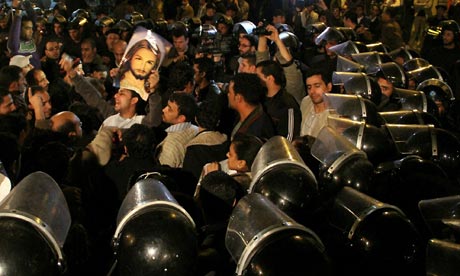Muslim-Coptic tension is just one aspect of a wider turmoil that will worsen until real democracy takes hold
By Osama Diab
This commentary was published in The Guardian on 04/01/2011

While hundreds of millions of people all over the world were celebrating the new year, Egypt's celebrations turned into a night of mourning just a few minutes into 2011. At 12:20, an explosion in front of a church in Alexandria left behind 21 dead and dozens of seriously injured churchgoers and passers-by.
Egypt's police had failed to protect the citizens despite receiving a threat from an Iraqi branch of al-Qaida two months ago. The group calling itself The Islamic State of Iraq said it would attack Egyptian Christians in response to an alleged kidnapping of two Coptic women who were said to have converted to Islam.
The timing of the attack – when security should have been at its tightest – is a manifestation of the state's failure to provide safety for its citizens.
Let's put this in context by looking at the lengths to which the security apparatus is willing to go to protect the regime. Road closures in Egypt are usually not the result of roadworks, but of completely emptying the streets for some government minister to drive home. The city is often paralysed when the president decides to run errands with his car instead of his helicopter. Also, try putting a handful of Egyptians on the streets with banners and before you notice, the few protesters will be surrounded, if not beaten up and arrested, by hundreds, if not thousands, of riot police.
But this comes as no surprise from a security system that has shifted its priorities from criminal investigation and regular policing to a politically motivated agenda that focuses on protecting an ailing regime that in turn focuses on nothing but its own survival in the face of growing opposition and political dissidence.
The eruption of sectarian tension is, therefore, only one part of a bigger problem. After 30 years in power, the Mubarak regime has proved unable and unwilling to find new and creative solutions for Egypt's critical issues. This has not only caused the Coptic problem to erupt, but the strategy of neglect has added many other complications. The Nubians are now calling for their rights and asking for recognition after suffering displacement and continuous marginalisation. The Bedouins of Sinai are endlessly clashing with police. And members of the Bahai'i faith have been protesting against the injustice they face due to their religious beliefs.
When it comes to services and the wellbeing of Egyptians, the government has failed to act effectively. It has failed to handle our rubbish, leaving it to pile up on the streets. Egypt was hit by daily power cuts last summer, sparking many protests against the government. Egypt currently holds the record for the highest rate of bird flu and Hepatitis C infections in the world. On top of that, Egypt has witnessed a multitude of railway accidents, sinking ships and road accidents that claim the lives of 12,000 people every year.
In short, these are all signs Egypt is turning into a failed state. The 2009 Failed States Index ranked in the "warning" category – 43rd from the bottom (out of 177 countries). Sectarian tension and violence is one indicator of state failure, where the security system and political leadership distance themselves from the people's affairs and in many cases work against their interests.
We should not blame it all on sectarian tension alone: the Muslim-Coptic tension is just one aspect of wider political turmoil and social disturbance. As long as this lifeless regime is in power, the unrest is likely to grow – especially in the runup to the presidential elections later this year.
The regime's inability to improve the people's standard of living, to enforce the rule of law, and to address racial, religious, social and gender-based discrimination is the root of all threats facing Egyptians today.
Consequently, in order for Coptic Christians to gain their rights, they need to fight the more broad "Egyptian cause" – alongside Muslims, Baha'is and seculars – instead of fighting their "Coptic cause" on their own. Copts will not gain their rights in a vacuum, and if they did, they would turn into a privileged group, further reinforcing their position as a targeted group. Until real democracy is established, the situation will continue to get worse on all levels; the Coptic issue, again, being just one of them.
No comments:
Post a Comment